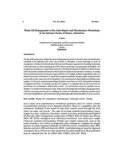Please use this identifier to cite or link to this item:
https://cris.library.msu.ac.zw//handle/11408/1971Full metadata record
| DC Field | Value | Language |
|---|---|---|
| dc.contributor.author | Jerie, Steven | - |
| dc.date.accessioned | 2017-05-31T08:40:09Z | - |
| dc.date.available | 2017-05-31T08:40:09Z | - |
| dc.date.issued | 2016 | - |
| dc.identifier.issn | 1815-9036 | - |
| dc.identifier.uri | http://hdl.handle.net/11408/1971 | - |
| dc.description | A publication by Professor Steven Jerie a Lecturer in the Department of Geography and Environmental Studies Midlands State University, Zimbabwe | en_US |
| dc.description.abstract | The aim of this study was to analyse the waste oil management practices in the auto-repair and maintenance workshops in the informal sector of the city of Harare in Zimbabwe. Current knowledge on waste oil management is limited to the formal industrial sector and this paper augments this knowledge by focusing on the informal sector that is employing over 80% of the economically active population of Zimbabwe. The study places special focus on Siyaso home industries in the high density suburb of Mbare in Harare because of the concentration of informal enterprises that include auto-repair and maintenance workshops. According to the Scottish Environment Protection Agency (SEPA), oil is a highly visible form of pollution when it is allowed to go into the environment. It causes harm to plants and animals, damages surface and ground water sources and can also cause severe soil contamination. Oil can destroy the natural habitat and drinking water supplies. It is the most commonly reported type of pollution and causes over 16% of all pollution incidents in England and Wales. Oil spreads very fast, for example, it is estimated that one litre of oil into the environment can contaminate a million litres of water. It is derived from mineral or synthetic sources, therefore, it is considered to be hazardous waste. Proper waste oil management at all stages of usage (generation, collection, processing and end use) is a challenge the world over especially in developing countries where environmental legislation is still weak and not being holistically enforced and Zimbabwe is not an exception. | en_US |
| dc.language.iso | en | en_US |
| dc.publisher | Midlands State University | en_US |
| dc.relation.ispartofseries | The Dyke: A Journal of the Midlands State University;Vol. 10, No. 2; p.1-9 | - |
| dc.subject | Waste oil, autorepair | en_US |
| dc.subject | Maintanance, informal sector, Harare | en_US |
| dc.title | Waste oil management in the auto-repair and maintenance workshops in the informal sector of Harare, Zimbabwe | en_US |
| dc.type | Article | en_US |
| item.fulltext | With Fulltext | - |
| item.cerifentitytype | Publications | - |
| item.grantfulltext | open | - |
| item.languageiso639-1 | en | - |
| item.openairecristype | http://purl.org/coar/resource_type/c_18cf | - |
| item.openairetype | Article | - |
| Appears in Collections: | Research Papers | |
Page view(s)
276
checked on Mar 3, 2026
Download(s)
80
checked on Mar 3, 2026
Google ScholarTM
Check
Items in MSUIR are protected by copyright, with all rights reserved, unless otherwise indicated.




